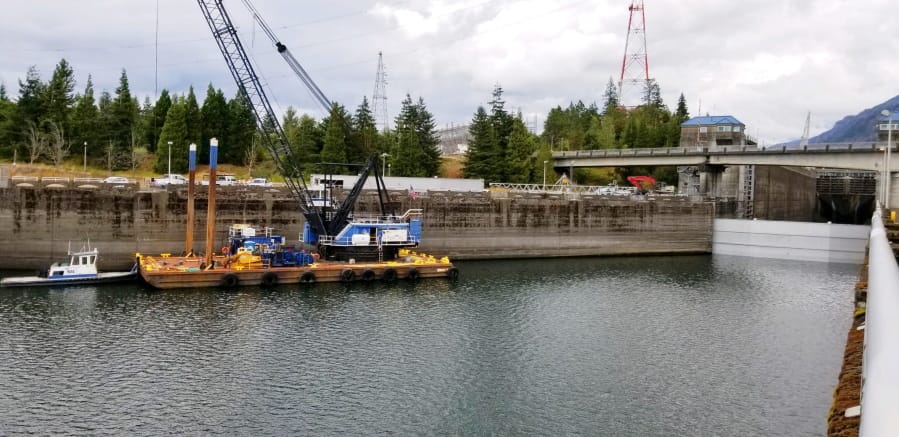The unexpected closure of the Bonneville Lock over the weekend has had an immediate effect on water traffic up and down the Columbia River, including traffic to and from Vancouver.
“This is a serious issue for ourselves and the entire region,” said Augusto Bassanini, CEO of grain export company United Grain, which operates at the Port of Vancouver.
Operators reported problems with the lock’s downstream gate on Thursday, and on Sunday the U.S. Army Corps of Engineers determined that water was leaking through cracks in a concrete sill underneath the gate, preventing the lock from filling properly.
According to the Corps’ social media posts, the lock was drained to allow machinery to be moved in to demolish the damaged sill. That work is expected to be completed Tuesday, but then the engineers will need to inspect the foundation underneath and make repairs, and as of late Monday afternoon, there was no estimate for how long that process would take.
In the meantime, Columbia River traffic is at a standstill. The Bonneville Dam and Lock is the first in a series of eight dam-and-lock installations on the Columbia and Snake rivers to the east of Vancouver that enable the transportation of millions of tons of agricultural goods down the river to be exported.
The closure of the westernmost lock puts a stop to nearly all of that traffic, and the disruption comes during the harvest season on a river system that carries more than 50 percent of all U.S. wheat exports.
“This would normally be a very busy time, especially for wheat transportation,” said Kristin Meira, executive director of the Pacific Northwest Waterways Association. “In the short term, folks can hold their products, but this is meant to be a system that’s always moving.”
United Grain brings in wheat, corn and soy through a mix of road, rail and river transportation. Barges only carry about 10 percent of its total volume, Bassanini said, but that percentage is higher for some wheat varieties — as much as 35 to 40 percent for soft white wheat, for example.
United Grain can get by using the grain in its silos at the port until about Sept. 20, Bassanini estimated, but the company will need to switch to costly alternative shipping methods if the lock isn’t reopened by then.
“Our reputation as a market is on the line if we can’t meet our obligations,” he said.
The lock typically closes in the spring for two or three weeks of maintenance, according to Jennifer Riddle, spokeswoman for Columbia River barge and tugboat operator Tidewater Transportation. But those closures are scheduled far in advance, and the current closure occurred without warning.
Unscheduled closures at Bonneville and other locks do sometimes happen, Meira said, but they’re very infrequent, thanks to proactive maintenance efforts from the Portland division of the U.S. Army Corps of Engineers.
Tidewater is also based at the Port of Vancouver. Approximately 77 percent of the company’s marine crewmembers have been affected by the outage, according to Riddle. Crewmen directly associated with Columbia and Snake River operations have been sent home.
There are contingency plans for some of the company’s operations, Riddle said. Tidewater serves as a contractor to haul garbage up the river from Clark County, but it switches from barges to trucks during scheduled dam closures, so that part of the business was able to quickly adjust.
Barges and tugboats hauling wheat and grain down the river are another story, Riddle said. Tidewater is working with wheat exporters to try to prevent the closure from creating a longer-term disruption in the flow goods along the river.
“At some point, there will be a ripple effect with the supply chain,” she said.
It hasn’t come to that yet though, and the company expressed confidence in the Corps’ ability to quickly fix the sill. Tidewater President Bob Curcio described the closure as “just a small bump in the road, before we’re up and running again for our clients.”
The most recent update from the Corps’ Bonneville Dam Facebook page showed demolition of the sill in progress on Monday afternoon, but still with no time estimate for when the lock might reopen.
The Bradford Island Visitor Center and Bradford and Robins islands recreation areas are also closed while repairs are in progress. The Washington Shore Visitor Center and Tanner Creek Recreation area are open on normal hours.




